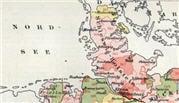Source Information

About Halle (Saale), Germany, Deaths, 1874-1957
About this collection
This collection contains death records from Halle (Saale) covering the years 1874 up to and including 1957. Halle, also known as "Halle on the Saale," was already a major city by 1890. It is situated in the modern German state of Saxony-Anhalt about 25 miles northwest of Leipzig. The first documentary mention of Halle was in 806. It was chartered in 961 and developed rapidly into an important trade center for salt and fabrics. Halle is the seat of one of the oldest universities in Germany. One of the city's notable landmarks on the market square is the Rote Turm (Red Tower), a clock tower built in 1506. During the time period of this collection, until 1944, Halle belonged to the Prussian Province of Saxony. This collection includes records from 17 communities which are today boroughs of modern Halle. The date ranges of records from these communities may vary.
Beginning on October 1, 1874, local registry offices were made responsible for creating birth, marriage and death records in the former Prussian provinces. The collected records are arranged chronologically and usually in bound yearbook form which are collectively referred to as "civil registers." For most of the communities included in the collection, corresponding alphabetical directories of names were also created. While churches continued to keep traditional records, the State also mandated that the personal or marital status of the entire population be recorded.
What you can find in the records
Death records were created using preprinted forms that were typically filled in by hand by the registrar. In each record the date of death usually differs from the date it was registered. Depending on the individual form or on the formulations used by the registrar, you may find:
- Sequential or Certificate Number
- Informant: Given Names, Last Name, Maiden Name, Occupation, Residence/Address, Denomination
- Deceased: Occupation, Given Names, Last Name, Maiden Name, Age, Denomination, Residence/Address, Place/Date of Birth, Spouse/Parents, Place/Date of Death, Time of Death
- Beginning in 1938, the records may also cross reference to corresponding birth and/or marriage registers
- From 1938 to 1957, the Cause of Death is often included
- Signatures
Entries in the name directories are ordered alphabetically according to the last name of the deceased, then by year of death. They are generally bound as separate volumes covering several years each. They contain the following details:
- Last Names, Given Names, Residence and Occupation of the deceased
- Cross-reference to death register
More about using this collection
Each record comprises one page. Additional events from the life of the deceased were sometimes recorded later on in the margins. These notes, sometimes referred to as "narration," can contain very useful information but they have not been indexed. As a result, information from the notes will not found via the search form. The “Informant” was usually a relative of the deceased. In later years death information was often submitted by hospital administrators or by an undertaker. These records also document casualties (Kriegssterbefälle) from the Second World War. Records for some of the dead were only later made available by the "German Office for the Notification of Next-of-Kin of Members of the Former German Armed Forces who were Killed in Action" (WASt) in Berlin. There is also a separate name directory available for First World War casualties. It can be found under "Halle-Nord; Halle-Süd" in the Civil Registration Office dropdown. Under "Browse this collection,” select the Register Type, Civil Registration Office and Year Range of the register desired. Name directories appear at the end of the Year Range lists.
 Need help with the German language? Find resources in our German Research Center.
Need help with the German language? Find resources in our German Research Center.